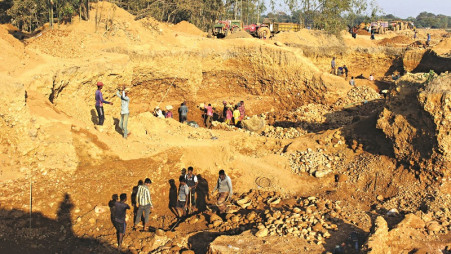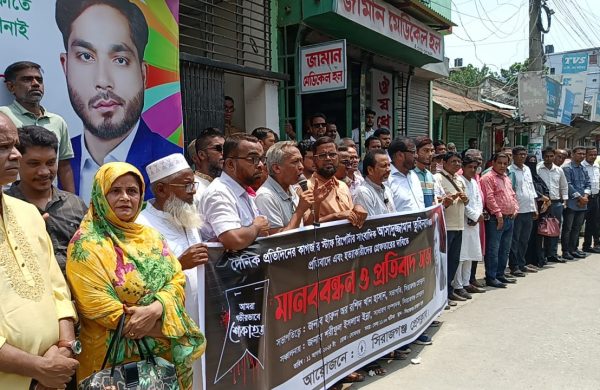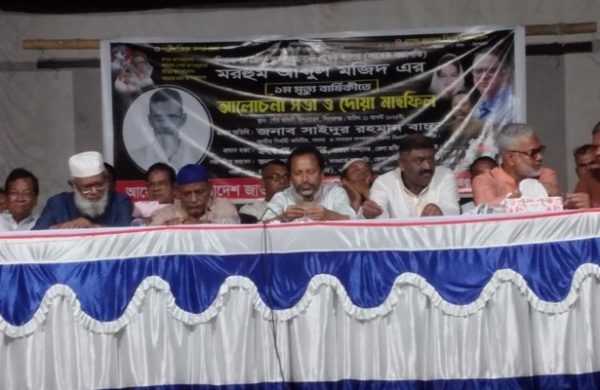Relentless stone looting ruins Bholaganj’s white stone quarry
- Update Time : Monday, August 11, 2025

Sylhet Correspondent:
The scenic tourist site of Saada Pathar in Bholaganj of Sylhet’s Companiganj, once famed for its pristine white stones and crystal-clear mountain streams, now lies ravaged by relentless illegal quarrying. What began as sporadic looting after August 5, 2023, has escalated into a full-scale, organised plunder threatening not only the region’s natural beauty but also its ecological and economic future.
Locals allege that the stone theft is being orchestrated under the patronage of BNP and its affiliate Juba Dal leaders, with involvement reportedly extending to figures from other political parties. The situation has deteriorated so severely over the past two weeks that the site is now described as “unrecognisable” by longtime residents.
Environmentalists warn that if the looting continues unchecked, Saada Pathar, a destination that once drew thousands of domestic tourists, could vanish entirely, dealing a major blow to local tourism and government revenue.
FROM NATURAL WONDER TO LOOTED WASTELAND
Saada Pathar first gained national attention in 2017, when a landslide along the Dhalai River deposited a striking five-acre bed of white stones. The local administration, led by then Deputy Commissioner Rahat Anwar and Upazila Nirbahi Officer (UNO) Abul Laish, took swift action to preserve the site as a tourist attraction. Later, under UNO Suman Acharya, a master plan was drafted to sustainably manage the area.
But with the fall of the previous government, all preservation efforts have collapsed. Today, the site is being stripped bare.
“Since August last year, stone looting has been happening openly, in broad daylight,” said a local resident. “The Ropeway Bunker area is also being targeted. Everyone is involved, there’s no resistance, only complicity.”
NIGHT-AND-DAY OPERATION: A SYNDICATE IN ACTION
According to multiple sources, over 1,000 boats have been used in the last three months to transport looted stones day and night. Videos circulating on social media show excavations at the heart of Saada Pathar, with workers digging up stones using spades and baskets. Some clips even capture scuffles breaking out over the division of loot.
Previously, stone collectors paid Tk 1,500-2,000 per boat, with an additional Tk 500-1,000 to “manage” the police. They could then sell the stones for Tk 5,000–6,000 per boat.
But the system has now changed. Sources say no per-boat fee is charged, but all extracted stones must be sold exclusively to a designated syndicate and at a fixed, suppressed price of Tk 1,500 per boat. No syndicate member is allowed to pay more, effectively creating a cartel.
“The entire ‘stone economy’ of Bholaganj is now under the control of a few local political leaders,” said a community leader, speaking on condition of anonymity. “After August 5, they took over completely.”
HOW THE LOOT MOVES
Thousands of labourers, armed with shovels and baskets, descend on the quarry daily. They load the stones onto barque boats, which ferry them to mills. There, the stones are crushed and sold to traders, who transport them across the country in trucks and pickups.
Despite the scale of the operation, the administration has no official data on how much stone has been stolen. Locals estimate that Tk 2,000-3,000 crore worth of stone has been looted in the past year alone, more than the total extracted over the previous 15 years.
“If this continues, Sylhet will run out of stones,” warned one environmental activist.
POLITICAL DENIALS AND ADMINISTRATIVE INACTION
When questioned, Bahar Ahmed Ruhel, Joint General Secretary of Sylhet District unit Jatiyatabadi Juba Dal, denied any involvement: “Most of those looting stones are outsiders. We have no connection to them. There’s no proof I’ve even visited the sites where stones are sold. BNP factions are spreading false propaganda against each other. We’re actually working to protect the stones.”
But Abdul Karim Chowdhury Kim, General Secretary of the Bangladesh Paribesh Andolan, Sylhet, painted a grim picture: “The amount of stone looted in the past year exceeds that of the past 15 years combined. Earlier, only one group was involved. Now, everyone is looting – organised, systematic, and unchallenged.”
He blamed the collapse of governance: “The administration has failed. The environmental advisor and his office knew about this but took no meaningful action. Local activists are helpless.”
To tourists, he offered a bitter invitation: “If you want to witness the destruction of nature, come to Saada Pathar.”
Police and administration: Overwhelmed and understaffed
Uzayer Mahmud Adnan, Officer-in-Charge of Companiganj Police Station, admitted the challenge: “We conduct joint task force operations with magistrates whenever we receive reports. The police cooperate, but we can’t stop it alone.”
Sylhet Deputy Commissioner Mohammad Sher Mahbub Murad acknowledged the scale of the problem: “Our operations are ongoing. The district administration conducts regular task force drives. But due to lack of manpower, we can’t fully control the situation. We are reviewing whether additional forces can be deployed.”
A RACE AGAINST TIME
Once a symbol of natural beauty and community-led conservation, Saada Pathar now stands as a stark example of what happens when governance fails and greed takes over.
With no immediate end in sight to the looting, environmentalists and locals alike fear that the only thing left behind may be dust, silence, and the ruins of a lost paradise.













